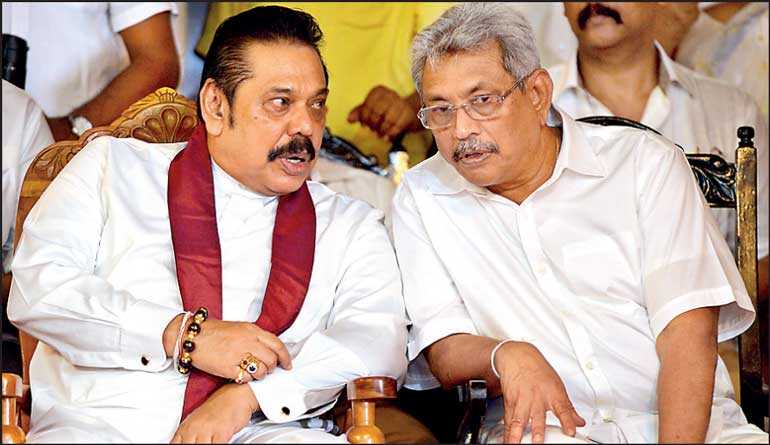
Canada’s foreign minister Mélanie Joly has announced targeted sanctions against Mahinda and Gotabaya Rajapaksa as well as Sunil Ratnayake and Chandana Prasad Hettiarachchi for “gross and systematic violations of human rights during the armed conflict in Sri Lanka”.
The sanctions will effectively freeze any assets they may hold in Canada, bar them from financial or related services and deem them inadmissible to Canada under the Immigration and Refugee Protection Act.
Commenting on the sanctions Joly stated:
“Over the past four decades, the people of Sri Lanka have suffered a great deal due to the armed conflict, economic and political instability, and gross violations of human rights. Canada is steadfast in its support to attain peace, reconciliation, justice, and accountability on the island. Canada has taken decisive action today to end international impunity against violators of international law."
"Canada stands ready to support Sri Lanka’s path to peace, inclusion, and prosperity through the advancement of accountability, reconciliation, and human rights, including international assistance to address the domestic crisis,” Joly added.

Rajapaksa brothers
During the final phase of the armed conflict, Mahinda Rajapaksa as Sri Lanka's president and Gotabaya Rajapaksa, as the Defence Secretary, oversaw the massacre of Tamil civilians in a brutal military campaign. Whilst figures on the number of civilians killed differ the International Truth and Justice Project has found that the highest estimate of those killed during that final phase could be as large as 169,796. During this period a litany of human rights abuses occurred including summary executions, mass rape, the indiscriminate shelling of food lines, hospitals and government-designated no-fire zones.
Following the armed conflict, journalists critical of the government would also be disappeared en-mass in white van abductions allegedly under the control of Gotabaya Rajapaksa. In July of last year, Gotabaya Rajapaksa was forced into exile following mass demonstrations against his family for bankrupting the country. Whilst in Singapore he tendered his resignation as Sri Lanka's president.
Sunil Ratnayake
Sergeant Sunil Ratnayake, was sentenced to death in 2015 for the murder of eight Tamils, including three children, in the town of Mirusuvil 2000. However, in 2020, he was released following a presidential pardon.
The Tamils had been arrested by Sri Lankan security forces on December 10, 2000. The following day their bodies were found in a mass grave with their throats slashed, according to the District Medical Officer’s post-mortem report. All but two of the bodies had been stripped naked. The youngest to have been murdered was a 5-year-old child.
In 2015, after a lengthy court process, Sunil Ratnayake, a member of the military’s elite Long Range Reconnaissance Patrol (LRRP), had been sentenced to death while the other men were cleared of all charges.
Chandana Hettiarachchi
Lieutenant Commander Chandana Prasad Hettiarachchi alias 'Navy Sampath', had earlier evaded arrest over the abduction and forced disappearance of 11 people, who were predominantly Tamil. He was later released on bail.
All 11 victims were abducted in Colombo between August 25, 2008 and February 2009 and held for ransom at navy bases in Colombo and Trincomalee, before being presumably murdered.
The statement released by the Canadian government further highlighted that Sri Lanka has taken "limited meaningful and concrete action to uphold its human rights obligations”.
The Canadian government added that “this jeopardizes progress on justice for affected populations, and prospects for peace and reconciliation”.
Canada further stressed the need to “establish a meaningful accountability process” and emphasised that these sanctions will “send a clear message that Canada will not accept continued impunity for those that have committed gross human rights violations in Sri Lanka”.
In addition to these sanctions, Canada announced $3 million humanitarian aid to Sri Lanka to address “immediate needs, including food security and livelihoods, shelter and non-food items, as well as nutritional assistance and primary healthcare services for vulnerable children and women”.
This was in response to an appeal made by the United Nations and the International Federation of Red Cross and Red Crescent Societies.
Responding to the sanctions, Gary Anandasangaree, a Canadian MP for Scarborough-Rouge Park, stated on Twitter:
The sanctions imposed by are a clear sign that those who are responsible for violations of international human rights law will be held accountable.
— Gary Anandasangaree (@gary_srp) January 10, 2023
While the journey towards accountability is long and painful, I continue to march with the survivors to ensure justice prevails.
Speaking to Tamil Guardian, US-based advocacy organisation People for Equality and Relief Lanka (PEARL) welcomed the targeted sanctions by Canada.
"Sanctions are a measure of public accountability for the endemic impunity in Sri Lanka. However, the international community needs to make sure to prioritise criminal justice, and commit to supporting victim-centric internationalized justice mechanisms, and to exercise universal jurisdiction to hold perpetrators accountable," the organisation said.
"Today’s announcement is a clear indication to the Sri Lankan state that Tamils continue to be committed to the cause of justice, and that accountability will be done," PEARL added.
The National Council of Canadian Tamils (NCCT) told Tamil Guardian that it "thanks and welcomes the Government of Canada for imposing sanctions on those who are responsible for gross and systematic violations of human rights on four Sri Lankan state officials, namely, Former President Gotabaya Rajapaksa, Former President Mahinda Rajapaksa, Staff Sergeant Sunil Ratnayake, Lieutenant Commander Chandana Prasad Hettiarachchi."
"NCCT believes this is another very important step towards getting accountability and remedial justice for Tamil Genocide. NCCT also thanks Canada's House of Commons for the unanimous motion passed on May 18th 2022 recognizing Tamil Genocide and May 18th as Tamil Genocide Remembrance Day," the organisation added.
